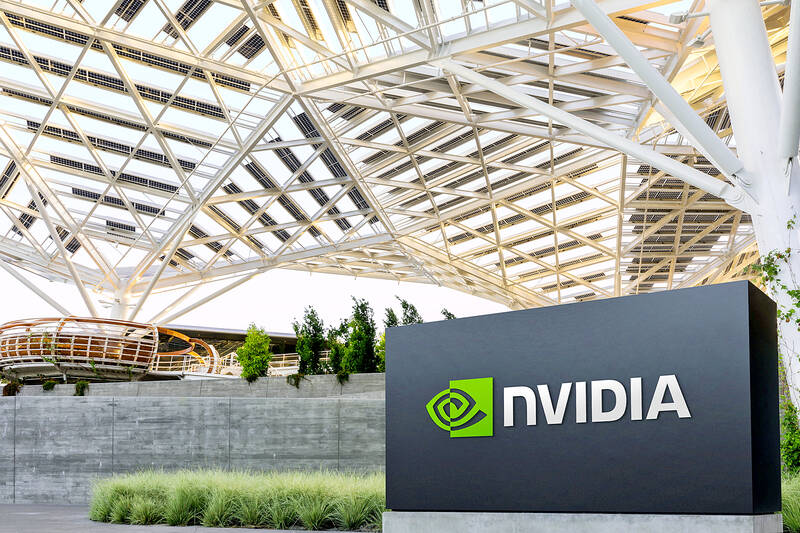Investors who snapped up shares of Nvidia Corp at the bottom of last month’s swoon were given a harsh reminder of the multiple forces pushing and pulling on the chipmaker’s business prospects.
What looked like a prescient bet last month — the stock surged 14 percent over 15 trading days — turned sour last week as shares tumbled on new US chip rules on China, a move that threatens a chunk of the one-fifth of Nvidia’s revenue that came from that country last quarter.
It was another harsh reminder for Nvidia fans that for all the hype around its position as a primary beneficiary of the artificial intelligence (AI) gold rush, the company’s more immediate prospects are at the mercy of the geopolitical struggle over the chips that power virtually every aspect of the modern world. It is also not immune to rising interest rates and the economic concerns weighing on markets.

Photo: Reuters courtesy of Nvidia
Nvidia vaulted to the top of performance charts in May after it gave a sales forecast that shattered analyst expectations and solidified the chipmaker as a main beneficiary of the AI trend. The stock’s record surge put Nvidia’s market capitalization in reach of US$1 trillion, a level it surpassed in June.
At its next earnings release in August, another blowout report catapulted shares to an all-time high.
Since reaching that peak, performance has been rockier. Shares fell 12 percent last month, Nvidia’s worst monthly performance this year, weighed down by concerns about demand sustainability.
The stock fell nearly 9 percent last week, but is still up 188 percent this year and remains the top performer on the S&P 500 and NASDAQ 100.
So far, Wall Street analysts have not changed their bullish tune on the stock.
While some have cut price targets, 95 percent of analysts have a buy-equivalent rating on Nvidia, data compiled by Bloomberg showed.
“This is a significant setback, but business is likely to continue to exceed expectations despite that,” Morgan Stanley analysts led by Joseph Moore — who recommended buying the stock in its September dip — wrote in a note on Wednesday last week, adding that Nvidia is still their top pick in the semiconductor sector.
Silvant Capital Management LLC chief investment officer Michael Sansoterra said the added export restrictions for China shipments hardly dent Nvidia’s long-term appeal.
“You’re going to see some volatility in the stock that’s not pleasant to go through, but it’s also not unexpected,” he said. “We like Nvidia in our portfolio, and we see value when it pulls back.”

CAUTIOUS RECOVERY: While the manufacturing sector returned to growth amid the US-China trade truce, firms remain wary as uncertainty clouds the outlook, the CIER said The local manufacturing sector returned to expansion last month, as the official purchasing managers’ index (PMI) rose 2.1 points to 51.0, driven by a temporary easing in US-China trade tensions, the Chung-Hua Institution for Economic Research (CIER, 中華經濟研究院) said yesterday. The PMI gauges the health of the manufacturing industry, with readings above 50 indicating expansion and those below 50 signaling contraction. “Firms are not as pessimistic as they were in April, but they remain far from optimistic,” CIER president Lien Hsien-ming (連賢明) said at a news conference. The full impact of US tariff decisions is unlikely to become clear until later this month

With an approval rating of just two percent, Peruvian President Dina Boluarte might be the world’s most unpopular leader, according to pollsters. Protests greeted her rise to power 29 months ago, and have marked her entire term — joined by assorted scandals, investigations, controversies and a surge in gang violence. The 63-year-old is the target of a dozen probes, including for her alleged failure to declare gifts of luxury jewels and watches, a scandal inevitably dubbed “Rolexgate.” She is also under the microscope for a two-week undeclared absence for nose surgery — which she insists was medical, not cosmetic — and is

GROWING CONCERN: Some senior Trump administration officials opposed the UAE expansion over fears that another TSMC project could jeopardize its US investment Taiwan Semiconductor Manufacturing Co (TSMC, 台積電) is evaluating building an advanced production facility in the United Arab Emirates (UAE) and has discussed the possibility with officials in US President Donald Trump’s administration, people familiar with the matter said, in a potentially major bet on the Middle East that would only come to fruition with Washington’s approval. The company has had multiple meetings in the past few months with US Special Envoy to the Middle East Steve Witkoff and officials from MGX, an influential investment vehicle overseen by the UAE president’s brother, the people said. The conversations are a continuation of talks that

Alchip Technologies Ltd (世芯), an application-specific integrated circuit (ASIC) designer specializing in artificial-intelligence (AI) chips, yesterday said that small-volume production of 3-nanometer (nm) chips for a key customer is on track to start by the end of this year, dismissing speculation about delays in producing advanced chips. As Alchip is transitioning from 7-nanometer and 5-nanometer process technology to 3 nanometers, investors and shareholders have been closely monitoring whether the company is navigating through such transition smoothly. “We are proceeding well in [building] this generation [of chips]. It appears to me that no revision will be required. We have achieved success in designing